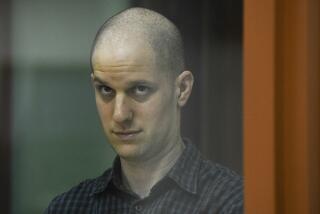E-Book Suspect Pleads Not Guilty
- Share via
SAN JOSE — Dmitry Sklyarov came to the United States expecting to stay only a couple days. On Thursday, a federal judge told the Russian programmer that his visit might last as long as 25 years.
The first person charged with violating the Digital Millennium Copyright Act, Sklyarov pleaded not guilty to five counts of creating technology that can circumvent the encryption on an electronic book.
Creating such computer programs is legal in Russia but illegal here since the act became law in 1998. Each of the charges against Sklyarov carries a maximum sentence of five years in prison.
Also pleading not guilty was Sklyarov’s employer, Moscow-based ElcomSoft Co., which was indicted on five similar charges.
The digital copyright act was passed at the behest of book publishers, music companies and other entertainment conglomerates that were worried that an unfettered Internet would cause them to lose control over their material. Making a photocopy of a book takes an hour; sending a million digital copies of a book takes about a second.
The program Sklyarov created for ElcomSoft theoretically could cause such mayhem. ElcomSoft, however, said its intended uses were much more modest: allowing the legitimate purchasers of an e-book to have some control over the material, including such now-forbidden activities as switching the text from one computer to another and printing out sections for the reader’s own use.
This conflict, between the potential for widespread piracy on the one hand and the restriction of the traditional rights of lawful readers on the other, is at the center of Sklyarov’s case. He was arrested last month after Adobe Systems Inc., whose encryption software he cracked, notified the FBI.
The problem won’t be solved any time soon, judging from three events in the last week: the failure of Sklyarov’s lawyers and federal prosecutors to reach a settlement allowing the programmer to return home to his wife and two young children; the release of a report from the U.S. Copyright Office saying that no changes are needed in the digital copyright act; and the apparently successful decryption of another leading e-book encryption program, this one made by Microsoft Corp.
Technology Review, a publication of the Massachusetts Institute of Technology, said on its Web site that an anonymous programmer had broken the anti-piracy features on the Microsoft Reader. The programmer said he developed the program for his own personal use and wouldn’t be releasing it.
The fact that it has been successfully done is sure to inspire others. Though the digital copyright act makes the anonymous programmer’s activities illegal, it is not illegal for consumers to use such programs.
In a study done at the request of Congress, the Copyright Office considered the so-called first-sale question and concluded that it is “premature to consider any legislative change at this time.”
With old-fashioned books and records, the first-sale provision meant that a buyer could do whatever he wanted with it, including reselling it or giving it away. Since the same e-book could be given away many times, publishers don’t want first-sale doctrine extended to electronic media. Librarians, however, do.
More to Read
Sign up for our Book Club newsletter
Get the latest news, events and more from the Los Angeles Times Book Club, and help us get L.A. reading and talking.
You may occasionally receive promotional content from the Los Angeles Times.










